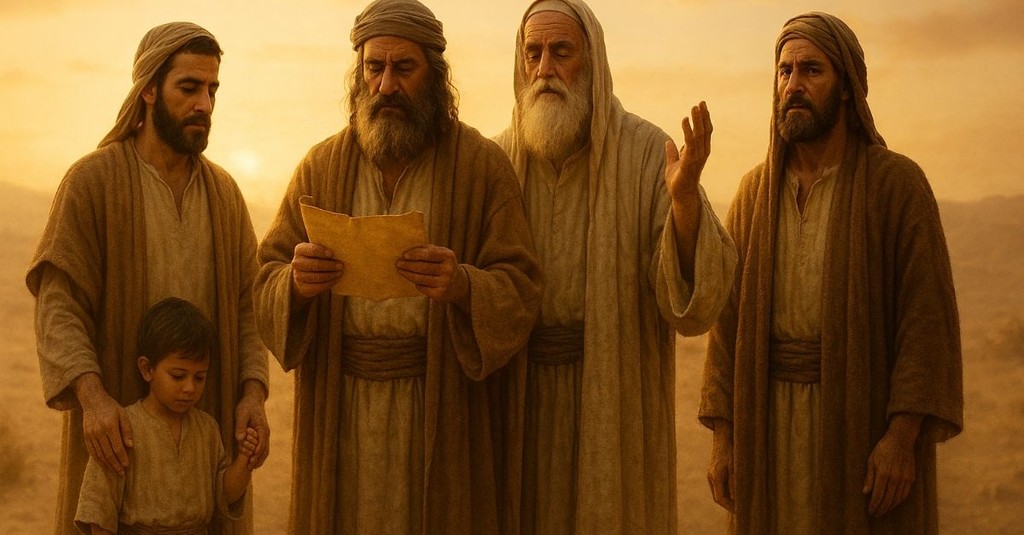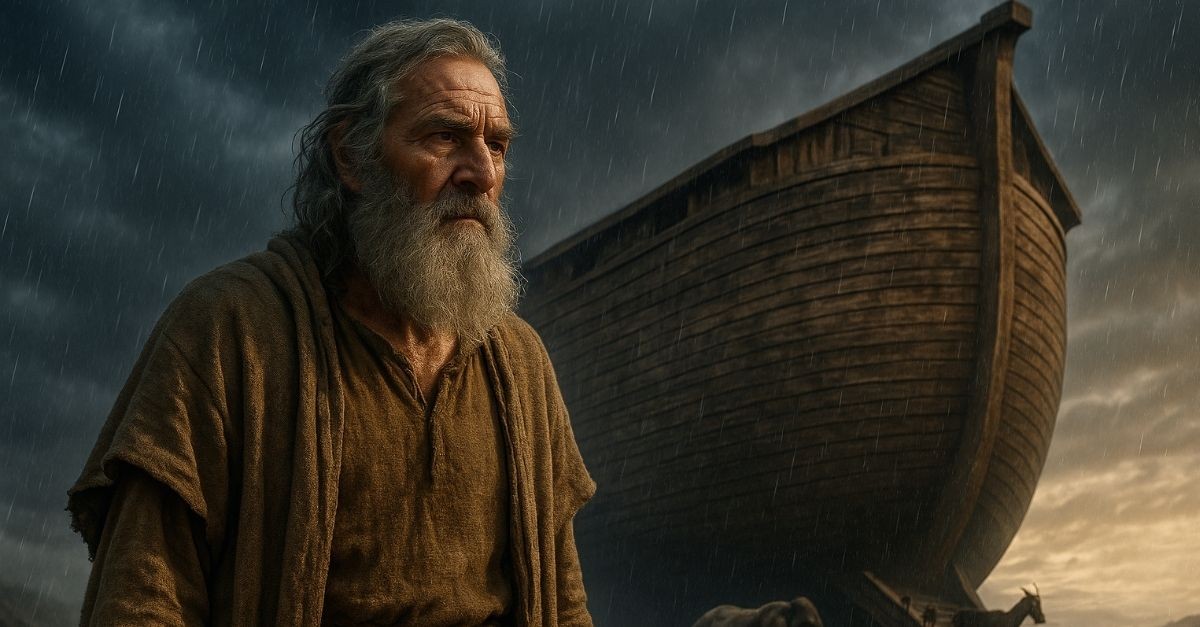
As Anthony Selvaggio puts it, “we all remember the sins of our fathers,” and we are meant to: there is a lot to learn from their mistakes. In fact, “the Bible [...] vividly records the failures of many fathers”. This is not in order that we should judge fathers: there is no perfect example of human fatherhood. Yet, Sam Crabtree mused that, ”in his perfection, [God] assigned your children their father”. Imperfect fathers are not a mistake, but even heroes of the faith got it wrong some of the time.
Photo Credit: Image created with AI

Noah Succumbed to Drink
Noah was faithful to the Lord, and we typically remember him for his faith. But on one occasion, “He drank of the wine and became drunk and lay uncovered in his tent” (Genesis 9:21). One of Noah’s sons, Ham, told his brothers about their father’s situation, and Noah cursed him for his indiscretion. “Wine is a mocker, strong drink a brawler, and whoever is led astray by it is not wise.” (Proverbs 20:1) This episode reminds us that even faithful men sometimes lack wisdom. Ham took advantage of Noah’s foolishness.
But his brothers acted with restraint and respect. Instead of laughing with Ham or spreading the word, “Shem and Japhet took a garment, laid it on both their shoulders, and walked backward and covered the nakedness of their father.” (v.23) All three sons witnessed the example of Noah’s faith and devotion to God; watched him at high points and low points. When faced with the scene of their father’s indecency, two chose to protect Noah, and one chose to expose him further.
The Lord used this scene from Noah’s life to remind us that we are responsible for our own sins. Jeremiah 31:33 says that God “will put my law within them, and I will write it on their hearts.”
The way Shem and Japheth tried to protect their father suggests that Noah often set a good example. They acted with mercy and respect, and were blessed for their discretion. When our imperfect fathers present us with both bad and good examples, we are responsible for choosing. We know right from wrong.
Photo Credit: created by AI

Eli Lacked the Courage to Discipline
Eli was a judge and high priest, with two sons whose behavior betrayed complete disregard for God. As priests themselves, they had a responsibility to serve their people and to act as role models of faith and self-discipline. Instead, “they abused their office and power in abominable ways.” For example, Selvaggio describes how they demanded that worshippers give them a portion of their sacrifices, and if they refused, would simply take it by force.” News of their behavior got back to Eli, whose impotent response was ‘Why do you do such things?’ (1 Samuel 2:23) He did not discipline Hophni and Phinehas, even after God sent a prophet to tell Eli that his line would fail as a result of his negligence and their sin.
Selvaggio comments that when Israel was at war with the Philistines, Eli’s wicked sons accompanied the Ark of the Covenant into battle. “The presence of the Ark normally assured victory to Israel, but this time the results were different.” Hophni and Phinehas died, Israel lost, and the Ark was captured by the Philistines. When he heard the news, Eli fell, broke his neck, and died - an ignominious end for a man who was appointed as spiritual leader for his people.
“The sin of Eli was that of permissiveness.” He could not have controlled his sons’ actions, nor should any father try to do so, but he should have corrected them and insisted on there being consequences for their actions. To neglect this part of parenting is unloving: “Eli teaches us [...] that it is an act of cruelty, harmful to a wide web of people,” when a father’s gentleness collapses into weakness. His sons died, and there were also consequences for Israel, which lost in their battle against the Philistines. He is an example of why we must discipline our children, not to the point of oppression, but with reasonableness and love.
Yet, the Lord has also given us Eli’s example as an adoptive parent to Samuel, who became an obedient follower and worshiper of God, a good spiritual leader, and confidante to King Saul. Derek Carter points out that Eli was a willing and patient adoptive father. The Lord used the priest’s gentle nature to his protégé’s benefit. Samuel 1:3 depicts this beautifully as “Samuel woke him up three times in the night because Samuel thought Eli had called him. Neither his age nor his failing eyesight stopped Eli from taking the time to teach the young boy how to recognize the voice of the Lord.”
Eli’s second chance at fatherhood stands out as a means of foreshadowing the Father’s adoptive love, which would be fleshed out in Christ’s relationship with marginalized people throughout his ministry. As Paul wrote to the church at Ephesus, God has “predestined us for adoption to himself as sons through Jesus Christ, according to the purpose of his will”. (Ephesians 1:5)
Photo Credit: Created by AI

Jephthah’s Ignorance, His Daughter’s Suffering
Anthony Salveggio says that some fathers become false teachers out of ignorance. “Such fathers have abdicated their role as spiritual leaders in the home, for they do not spend time equipping themselves with the biblical knowledge and spiritual disciplines needed to faithfully fulfil their role.” Jephthah’s daughter suffered due to her father’s ignorance of God’s character.
Jephthah was a powerful and effective soldier who fought for Israel when they desperately lacked skilled warriors. He made a hasty and thoughtless vow to God that, if they were victorious in battle, he would sacrifice whatever came out of his house first to meet him upon his return from the field of battle. “The account of Jephthah’s daughter is one of the most troubling portions of Scripture. She [...] was the victim of a spiritually ignorant father.” His daughter was the first to greet him, so Jephthah kept his promise and sacrificed her.
His promise was rash: “A godly man would not attempt to bribe God as if he were a pagan idol.” Jephtha’s initial mistake was to try to manipulate the Lord. Secondly, his daughter need not have died - Jephthah could have referred to God’s own law in which he states his abhorrance for human sacrifice, “particularly the practice of sacrificing children (Deuteronomy 12:31).” And finally, if he had prayed, God might have revealed a better set of instructions in order to save the young girl. He should have known God better.
When fathers today preach that God is a loveless, blood-thirsty tyrant seeking vengeance for our sins, they are not teaching the true gospel. Of course, Jephthah could not reflect upon Calvary as we do today, but he might have remembered how God provided Abraham with a sacrifice in place of his son, Isaac, so that he would not have to sacrifice his son. This tragic story reminds us how important it is to teach our children the truth about the Lord’s loving character.
But God has also redeemed Jephthah’s story. Says one scholar, “Jephthah is listed among the faithful in Hebrews 11:32, indicating that despite his tragic vow, he was recognized for his faith and leadership in delivering Israel from oppression.” Moreover, his daughter’s willingness to fulfill her Father’s vow demonstrates that he had taught her to trust the Lord with her life. If children copy what they see, her submission to the fate that awaited her tells us Jephthah sought to provide his only child with a faithful example.
Photo Credit: Created by AI

David Was Afraid of His Children
One scholar explains that David feared for his life, not only because of threats from Saul, or from other nations: these threats “extended to his own family. The rebellion of his son Absalom is a poignant example.” His son’s rebellion occurred after the rape of Tamar, perhaps even as a result of David’s response. “When King David heard of all these things, he was very angry.” (2 Samuel 13:21) Yet, David did not seek justice for Tamar.
David’s failure to punish Amnon is one of the darkest periods of a reign filled with many dark moments. David was a passionate and sometimes thoughtless man who might have failed to recognize what Amnon really took from Tamar. After all, David had a weakness for women and did not respect them. He was accustomed to taking what he wanted and not considering the consequences, such as when he betrayed Uriah by taking Bathsheba, then sending Uriah to his death in order to cover the sin of adultery. Amnon followed suit.
At the very least, David should have been aware that Absalom would regard this incident as the justification he needed to try and wrest control from his father. Their conflict endangered the kingdom. Any king, especially one with so many sons, faced threats to his leadership if he did not act swiftly and wisely to throw sand on the slightest spark. With greater forethought, punishing Amnon would have made political sense even if he overlooked his daughter’s value as a human being.
In spite of these sins, David was a man of faith, one who confessed and repented many times. His Psalms record vulnerability and submission, confession and repentance. In Psalm 51, David cries out, “Have mercy on me, O God, according to your steadfast love; according to your abundant mercy blot out my transgressions.” (v.1)
The average American cannot relate to David’s circumstances: his courageous stand against Goliath, fleeing from murder attempts plotted by a jealous king; a life of leadership and warfare. Yet, we can relate to his struggle with sin and submission to God. David’s Psalms provide an honest record of this inner conflict, but also of what God wants from us: humility, honesty, confession, repentance, and fervor for the Lord. “The Lord is my rock and my fortress and my deliverer, my God, in whom I take refuge, my shield, and the horn of my salvation, my stronghold. I call upon the Lord, who is worthy to be praised, and I am saved from my enemies.” (Psalm 18:2-3)
David’s words are rich with joy, worship, and praise for God, even though his life was threatened when he wrote them. David has much to show us about a faith that delights in the Lord during difficult times, whether those difficulties are external or come from one’s own sinful inclinations.
Imperfect examples of fatherhood are everywhere in the Bible, in history, and in our own homes. There are no perfect fathers. But we know what imperfection looks like because our God is just and loving, and he sent Christ to show us what perfection is. All of those mistakes, those failings and sins, point us to Jesus. And by his death, all fathers who believe in Christ alone are redeemed. We need to pray for the men in our lives that their status as sons enables them to make peace with the mistakes they make as fathers. And, thanks to those Biblical examples, perhaps children can also forgive their fathers when they see that many challenges to parenting are patterns ingrained across millennia of fatherhood, repeated, but also redeemed by a loving and just Father.
Sources:
https://www.evangelical-times.org/three-bad-dads-of-the-bible-i/
https://www.desiringgod.org/articles/fatherhood-for-imperfect-dads
https://www.focusonthefamily.com/pro-life/samuel-the-prophet-an-adoption-story/
https://www.evangelical-times.org/three-bad-dads-of-the-bible-2/
https://biblehub.com/topical/j/jephthah's_tragic_vow.htm
https://biblehub.com/topical/d/david's_fear_and_decision.htm
https://www.evangelical-times.org/three-bad-dads-of-the-bible-i/
https://www.evangelical-times.org/three-bad-dads-of-the-bible-3/
Photo Credit: Created by AI

Originally published Saturday, 10 May 2025.
